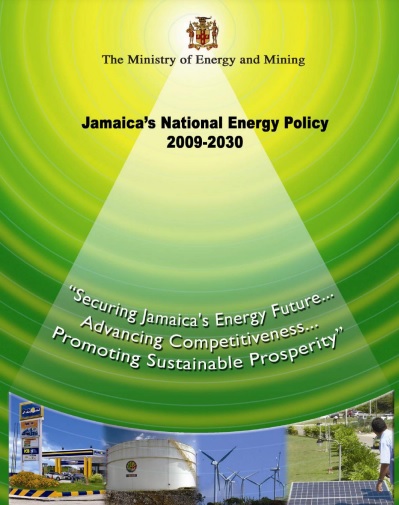At the end of each academic year, students receive a report card from their teachers, which outline the progress made. Whether it’s A+ in Mathematics, or there is need for improvement in English Language, the students are informed of their strengths and weakness, as well as feedback on how to improve. Let’s take the same approach to the climate change and energy transition conversation. If we are to rank the Caribbean region, what grade would it receive?
More specifically, when we look at Jamaica’s track record for example and its ability to make an eco-friendlier transition to the cleaner, renewable energy, where would we fare?
‘A’+ or ‘Failing Miserably’? Let’s decide.
With class in session, it’s important to frame what will be discussed. The aim of this paper is to appreciate the concept of energy transition and highlighting key points of the energy policy and framework which under girths Jamaica’s energy transition.
According to the International Renewable Energy Agency, energy transition is a pathway toward transformation of the global energy sector from fossil-based to zero-carbon by the second half of the century. In essence, it is the move from heavy dependence on fossil-fuels to cleaner, more environmentally friendly energy sources, with the intention of limiting the rapid effects of climate change. The ‘cleaner’ energy sources which do minimal harm to the environment and exist in large quantities for now and the future generations are known as renewable energy. These sources of energy may include solar energy, wind energy, biogas- which is produced from organic material to name a few.
In sum, we want you to be able to charge your phones, do all your daily activities, not at the expense of the environment and the climate, by relying on energy that emits very little waste, in comparison to fossil-based energy sources which have significantly harmed the environment. Now, let’s look at the policy or regulatory framework.
THE POLICY
According to the Ministry of Science, Energy and Technology of Jamaica, the island’s energy system is highly dependent on imported fossil fuels with petroleum imports accounting for over 80 per cent of electricity production. The oil imports are rather costly, costing thousands of dollars annually, which translates to high electricity bills incurred by consumers.
In light of these factors, the government has been dedicated to reducing its reliance on fossil energy. As reported in the Energy Transition Initiative Report of 2018, Jamaica’s Renewable Energy Goals by 2015 was 12.5 per cent and 20 per cent by 2030. With just eight years shy of that target, one questions what metric exists to see if we are on the right path or overly ambitious in our quest.
The National Energy Policy is underpinned by The Strategic Framework, which are the sector goals and strategies.
For that, we can turn our attention to the National Energy Policy of Jamaica, published in 2009. It is the first comprehensive long-term energy plan outlining benchmarks to be attained in relation to renewable electricity generation, energy efficiency and greenhouse gas emissions to be met by 2030.
The National Energy Policy is underpinned by The Strategic Framework, which are the sector goals and strategies. It addresses both the supply and demand energy issues in Jamaica and prioritises seven key areas such as:
● Security of Energy Supply through diversification of fuels as well as development of renewable energy sources
● Modernising the country’s energy infrastructure
● Development of renewable energy sources such as solar and hydro
● Conservation and efficiency in use of energy
● Development of a comprehensive governance/regulatory framework for the energy sector
● Enabling government ministries and agencies to be models/best practice for the rest of society in terms of energy management; and
● Eco-efficiency in industries
The National Energy Policy recognises the collaborative efforts needed to move from ambitious goals to implementation. Agencies such as: The Ministry of Finance, Ministry of Environment (which is a part of the Ministry of Economic Growth and Job Creation), Jamaica Public Service (Jamaica’s Energy monopoly), non-government organisations and other stakeholders are included in the policy as helping hands to make the transition a reality. To achieve these goals, the government in collaboration with some the agencies mentioned above, have provided tax exemptions for energy efficiency equipment, energy labelling for refrigerators and utility-led energy audit programs. Other measures include reducing energy costs by 30 per cent by implementing renewable energy sources on public buildings and, National Building Codes were updated in 2009 to align with International Building Codes to capture specific requirements for energy consumption and conservation.
The policy also covers net metering, which, according to the Jamaica Power Service, the dominant supplier of electricity, this is where a customer owns renewable energy generators such as wind or sun and produces enough electricity for personal use, while selling excess to the power company at an “avoided cost” or wholesale price as stated by the Office of Utilities Regulation. There exist policies on Green Public Procurement, which encourages the government to purchase goods and services that cause minimal negative environmental impact.
With focus on these priority areas and proposed solutions, the National Energy Policy strives to play its part in reducing the effects of climate change, reducing the import bill of crude oil and capitalising on renewable energy sources and promoting conservation and efficiency in the use of energy, across several sectors.
On the latter point, the energy sector is the heart of several industries in Jamaica. The policy contemplates measures which the government wishes to undertake in relation to energy efficiency initiatives in various fields. Let’s turn our attention to some of the industries.

The agricultural sector is the bread and butter of Jamaica’s economy. It is also one of the greatest consumers of energy. The policy contemplates the development of biofuels, ethanol, and biodiesel. Using water-conserving irrigation systems to water crops is more energy efficient as, currently, 75 per cent of irrigation systems are reliant on petroleum-fuelled deep wells as well developing and using recycled water from waste management plants.
Similarly, in the construction, housing, offices, factories and hotels industry, the construction industry will be held to the standards outlined in the Energy Efficient Building Code. Therefore, architects and engineers are to design buildings which incorporate energy efficient lighting and cooling systems, and reliance on energy-efficient construction methodologies. Also, incentives will be given for constructing carbon neutral buildings that would use no energy from the national power grid.
Furthermore, the Ministry of Finance and the Public Service hopes to develop and implement a programme of incentives and fiscal measures to enable and support investments in modern facilities and infrastructure in the energy sector; energy efficiency and conservation; and development of renewable energy options. The ministry will seek to engage financial institutions to encourage financial support for energy projects, especially those focused on renewable energy, Llquified natural gas (LNG) and power generation plants. In addition, a system of shared decision-making will be stated and agreed upon so that decisions of the Ministry of Finance related to energy will be collaborative and consistent with the National Energy Policy.

In closing, the National Energy Policy of Jamaica, at its core, hopes to use a collaborative approach to yield cleaner energy and a healthy environment, which will boost the economy by cutting down on the high fossil fuel import bills. It seeks to create delicate balance between a clean environment and energy production, terms which are often seen as a paradox. By outlining its goals, the Jamaican government has shown its commitment to climate action and bolstering a place, which we can be proud to live, work, raise families and do business, in tandem with Vision 2030. It reflects the aspirations of becoming a nation committed to integrating energy and environmental policies to transition into a green economy (a fancy word which captures the ability to work, produce and live while producing less carbon emissions which harm the environment. So, making a buck just not at the expense of the environment).
Therefore, understanding all the goals and commitments of the government, society- as the teacher may be motivated to give an ‘A+’ for these eco-conscious solutions and strategies. However, with all policies, we must be as ambitious in the implementation as we are in the drafting of these goals.
As such, we may have to wait until the next ‘academic term’ to assess how many of these goals have been materialised and see whether Jamaica can maintain that ‘A+’ or will it be ‘Failing measurably’ considering the policy has been in effect since 2009 and we’re now on the cusp of another year, drawing closer to Vision 2030.
– This story was published with the support of Climate Tracker
– Tamoy Campbell is a Climate Tracker Fellow, Law Student at The Norman Manley Law School and Youth Writer. Send feedback to editorial@our.today and tamoycampbell25@gmail.com
This story is part of Caribbean Energy Transition Journalism Workshop. Tamoy is one of the finalists, meet the full team here!
